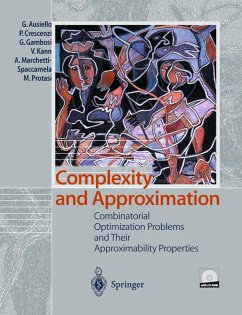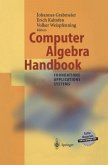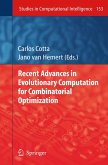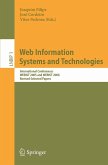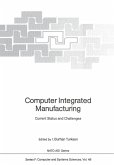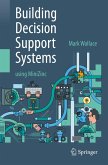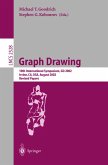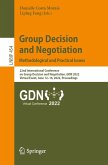Giorgio Ausiello, Pierluigi Crescenzi, Giorgio Gambosi, Viggo Kann, Alberto Marchetti-Spaccamela, Marco Protasi
Complexity and Approximation (eBook, PDF)
Combinatorial Optimization Problems and Their Approximability Properties
57,95 €
57,95 €
inkl. MwSt.
Sofort per Download lieferbar

29 °P sammeln
57,95 €
Als Download kaufen

57,95 €
inkl. MwSt.
Sofort per Download lieferbar

29 °P sammeln
Jetzt verschenken
Alle Infos zum eBook verschenken
57,95 €
inkl. MwSt.
Sofort per Download lieferbar
Alle Infos zum eBook verschenken

29 °P sammeln
Giorgio Ausiello, Pierluigi Crescenzi, Giorgio Gambosi, Viggo Kann, Alberto Marchetti-Spaccamela, Marco Protasi
Complexity and Approximation (eBook, PDF)
Combinatorial Optimization Problems and Their Approximability Properties
- Format: PDF
- Merkliste
- Auf die Merkliste
- Bewerten Bewerten
- Teilen
- Produkt teilen
- Produkterinnerung
- Produkterinnerung

Bitte loggen Sie sich zunächst in Ihr Kundenkonto ein oder registrieren Sie sich bei
bücher.de, um das eBook-Abo tolino select nutzen zu können.
Hier können Sie sich einloggen
Hier können Sie sich einloggen
Sie sind bereits eingeloggt. Klicken Sie auf 2. tolino select Abo, um fortzufahren.

Bitte loggen Sie sich zunächst in Ihr Kundenkonto ein oder registrieren Sie sich bei bücher.de, um das eBook-Abo tolino select nutzen zu können.
This book documents the state of the art in combinatorial optimization, presenting approximate solutions of virtually all relevant classes of NP-hard optimization problems. The wealth of problems, algorithms, results, and techniques make it an indispensible source of reference for professionals. The text smoothly integrates numerous illustrations, examples, and exercises.
- Geräte: PC
- ohne Kopierschutz
- eBook Hilfe
- Größe: 71.54MB
Andere Kunden interessierten sich auch für
![Computer Algebra Handbook (eBook, PDF) Computer Algebra Handbook (eBook, PDF)]() Computer Algebra Handbook (eBook, PDF)113,95 €
Computer Algebra Handbook (eBook, PDF)113,95 €![Recent Advances in Evolutionary Computation for Combinatorial Optimization (eBook, PDF) Recent Advances in Evolutionary Computation for Combinatorial Optimization (eBook, PDF)]() Recent Advances in Evolutionary Computation for Combinatorial Optimization (eBook, PDF)113,95 €
Recent Advances in Evolutionary Computation for Combinatorial Optimization (eBook, PDF)113,95 €![Web Information Systems and Technologies (eBook, PDF) Web Information Systems and Technologies (eBook, PDF)]() Web Information Systems and Technologies (eBook, PDF)40,95 €
Web Information Systems and Technologies (eBook, PDF)40,95 €![Computer Integrated Manufacturing (eBook, PDF) Computer Integrated Manufacturing (eBook, PDF)]() Computer Integrated Manufacturing (eBook, PDF)73,95 €
Computer Integrated Manufacturing (eBook, PDF)73,95 €![Building Decision Support Systems (eBook, PDF) Building Decision Support Systems (eBook, PDF)]() Mark WallaceBuilding Decision Support Systems (eBook, PDF)48,95 €
Mark WallaceBuilding Decision Support Systems (eBook, PDF)48,95 €![Graph Drawing (eBook, PDF) Graph Drawing (eBook, PDF)]() Graph Drawing (eBook, PDF)40,95 €
Graph Drawing (eBook, PDF)40,95 €![Group Decision and Negotiation: Methodological and Practical Issues (eBook, PDF) Group Decision and Negotiation: Methodological and Practical Issues (eBook, PDF)]() Group Decision and Negotiation: Methodological and Practical Issues (eBook, PDF)44,95 €
Group Decision and Negotiation: Methodological and Practical Issues (eBook, PDF)44,95 €-
-
-
This book documents the state of the art in combinatorial optimization, presenting approximate solutions of virtually all relevant classes of NP-hard optimization problems. The wealth of problems, algorithms, results, and techniques make it an indispensible source of reference for professionals. The text smoothly integrates numerous illustrations, examples, and exercises.
Hinweis: Dieser Artikel kann nur an eine deutsche Lieferadresse ausgeliefert werden.
Dieser Download kann aus rechtlichen Gründen nur mit Rechnungsadresse in A, B, BG, CY, CZ, D, DK, EW, E, FIN, F, GR, HR, H, IRL, I, LT, L, LR, M, NL, PL, P, R, S, SLO, SK ausgeliefert werden.
Hinweis: Dieser Artikel kann nur an eine deutsche Lieferadresse ausgeliefert werden.
Produktdetails
- Produktdetails
- Verlag: Springer Berlin Heidelberg
- Seitenzahl: 524
- Erscheinungstermin: 6. Dezember 2012
- Englisch
- ISBN-13: 9783642584121
- Artikelnr.: 53091378
- Verlag: Springer Berlin Heidelberg
- Seitenzahl: 524
- Erscheinungstermin: 6. Dezember 2012
- Englisch
- ISBN-13: 9783642584121
- Artikelnr.: 53091378
- Herstellerkennzeichnung Die Herstellerinformationen sind derzeit nicht verfügbar.
Giorgio Ausiello is Professor Emeritus in the Dipartimento di Ingegneria Informatica, Automatica e Gestionale, Università di Roma "La Sapienza". He has coauthored numerous formal academic journal and conference publications. He has chaired many related conferences and research groups, and he was a founding member of the European Association for Theoretical Computer Science (EATCS), and its President from 2006 to 2009. His main research interests include on-line algorithms, approximation algorithms, dynamic graph algorithms, optimization problems in vehicle routing and logistics, and streaming algorithms; he has also researched and published on programming theorys, computational complexity, and database theory.
1 The Complexity of Optimization Problems.- 1.1 Analysis of algorithms and complexity of problems.- 1.2 Complexity classes of decision problems.- 1.3 Reducibility among problems.- 1.4 Complexity of optimization problems.- 1.5 Exercises.- 1.6 Bibliographical notes.- 2 Design Techniques for Approximation Algorithms.- 2.1 The greedy method.- 2.2 Sequential algorithms for partitioning problems.- 2.3 Local search.- 2.4 Linear programming based algorithms.- 2.5 Dynamic programming.- 2.6 Randomized algorithms.- 2.7 Approaches to the approximate solution of problems.- 2.8 Exercises.- 2.9 Bibliographical notes.- 3 Approximation Classes.- 3.1 Approximate solutions with guaranteed performance.- 3.2 Polynomial-time approximation schemes.- 3.3 Fully polynomial-time approximation schemes.- 3.4 Exercises.- 3.5 Bibliographical notes.- 4 Input-Dependent and Asymptotic Approximation.- 4.1 Between APX and NPO.- 4.2 Between APX and PTAS.- 4.3 Exercises.- 4.4 Bibliographical notes.- 5 Approximation through Randomization.- 5.1 Randomized algorithms for weighted vertex cover.- 5.2 Randomized algorithms for weighted satisfiability.- 5.3 Algorithms based on semidefinite programming.- 5.4 The method of the conditional probabilities.- 5.5 Exercises.- 5.6 Bibliographical notes.- 6 NP, PCP and Non-approximability Results.- 6.1 Formal complexity theory.- 6.2 Oracles.- 6.3 The PCP model.- 6.4 Using PCP to prove non-approximability results.- 6.5 Exercises.- 6.6 Bibliographical notes.- 7 The PCP theorem.- 7.1 Transparent long proofs.- 7.2 Almost transparent short proofs.- 7.3 The final proof.- 7.4 Exercises.- 7.5 Bibliographical notes.- 8 Approximation Preserving Reductions.- 8.1 The World of NPO Problems.- 8.2 AP-reducibility.- 8.3 NPO-completeness.- 8.4 APX-completeness.- 8.5 Exercises.- 8.6 Bibliographical notes.- 9 Probabilistic analysis of approximation algorithms.- 9.1 Introduction.- 9.2 Techniques for the probabilistic analysis of algorithms.- 9.3 Probabilistic analysis and multiprocessor scheduling.- 9.4 Probabilistic analysis and bin packing.- 9.5 Probabilistic analysis and maximum clique.- 9.6 Probabilistic analysis and graph coloring.- 9.7 Probabilistic analysis and Euclidean TSP.- 9.8 Exercises.- 9.9 Bibliographical notes.- 10 Heuristic methods.- 10.1 Types of heuristics.- 10.2 Construction heuristics.- 10.3 Local search heuristics.- 10.4 Heuristics based on local search.- 10.5 Exercises.- 10.6 Bibliographical notes.- A Mathematical preliminaries.- A.1 Sets.- A.1.1 Sequences, tuples and matrices.- A.2 Functions and relations.- A.3 Graphs.- A.4 Strings and languages.- A.5 Boolean logic.- A.6 Probability.- A.6.1 Random variables.- A.7 Linear programming.- A.8 Two famous formulas.- B A List of NP Optimization Problems.
1 The Complexity of Optimization Problems.- 1.1 Analysis of algorithms and complexity of problems.- 1.2 Complexity classes of decision problems.- 1.3 Reducibility among problems.- 1.4 Complexity of optimization problems.- 1.5 Exercises.- 1.6 Bibliographical notes.- 2 Design Techniques for Approximation Algorithms.- 2.1 The greedy method.- 2.2 Sequential algorithms for partitioning problems.- 2.3 Local search.- 2.4 Linear programming based algorithms.- 2.5 Dynamic programming.- 2.6 Randomized algorithms.- 2.7 Approaches to the approximate solution of problems.- 2.8 Exercises.- 2.9 Bibliographical notes.- 3 Approximation Classes.- 3.1 Approximate solutions with guaranteed performance.- 3.2 Polynomial-time approximation schemes.- 3.3 Fully polynomial-time approximation schemes.- 3.4 Exercises.- 3.5 Bibliographical notes.- 4 Input-Dependent and Asymptotic Approximation.- 4.1 Between APX and NPO.- 4.2 Between APX and PTAS.- 4.3 Exercises.- 4.4 Bibliographical notes.- 5 Approximation through Randomization.- 5.1 Randomized algorithms for weighted vertex cover.- 5.2 Randomized algorithms for weighted satisfiability.- 5.3 Algorithms based on semidefinite programming.- 5.4 The method of the conditional probabilities.- 5.5 Exercises.- 5.6 Bibliographical notes.- 6 NP, PCP and Non-approximability Results.- 6.1 Formal complexity theory.- 6.2 Oracles.- 6.3 The PCP model.- 6.4 Using PCP to prove non-approximability results.- 6.5 Exercises.- 6.6 Bibliographical notes.- 7 The PCP theorem.- 7.1 Transparent long proofs.- 7.2 Almost transparent short proofs.- 7.3 The final proof.- 7.4 Exercises.- 7.5 Bibliographical notes.- 8 Approximation Preserving Reductions.- 8.1 The World of NPO Problems.- 8.2 AP-reducibility.- 8.3 NPO-completeness.- 8.4 APX-completeness.- 8.5 Exercises.- 8.6 Bibliographical notes.- 9 Probabilistic analysis of approximation algorithms.- 9.1 Introduction.- 9.2 Techniques for the probabilistic analysis of algorithms.- 9.3 Probabilistic analysis and multiprocessor scheduling.- 9.4 Probabilistic analysis and bin packing.- 9.5 Probabilistic analysis and maximum clique.- 9.6 Probabilistic analysis and graph coloring.- 9.7 Probabilistic analysis and Euclidean TSP.- 9.8 Exercises.- 9.9 Bibliographical notes.- 10 Heuristic methods.- 10.1 Types of heuristics.- 10.2 Construction heuristics.- 10.3 Local search heuristics.- 10.4 Heuristics based on local search.- 10.5 Exercises.- 10.6 Bibliographical notes.- A Mathematical preliminaries.- A.1 Sets.- A.1.1 Sequences, tuples and matrices.- A.2 Functions and relations.- A.3 Graphs.- A.4 Strings and languages.- A.5 Boolean logic.- A.6 Probability.- A.6.1 Random variables.- A.7 Linear programming.- A.8 Two famous formulas.- B A List of NP Optimization Problems.
